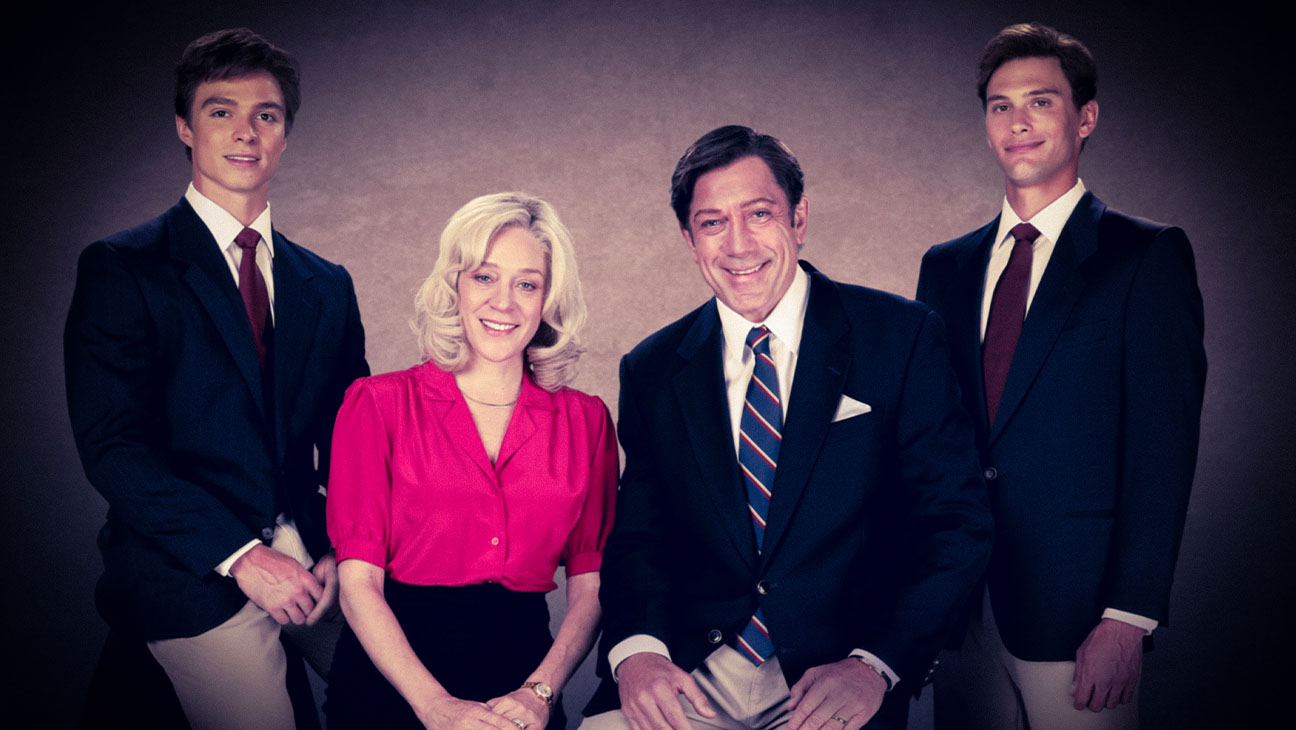Most viewers of the new trailer for Ryan Murphy’s upcoming limited series, Monsters: The Lyle and Erik Menendez Story, will find the TV spot jarring. Not because of its concept, where smiles drop from the Menendez family’s faces after they pose for a portrait as the voices of the mother and father are heard in a voice-over and the two now-shirtless sons embrace one another as a gun blast is heard, spraying blood across the face of one of the young men.
Certainly, the cracks appearing in the portrait of a “perfect” family establish a dark tone. But it’s the voice-over from Chloe Sevigny and Javier Bardem, who portray the slain Menendez parents, which may cause some whiplash. “I need to know what’s going on with you and the boys,” is whispered, followed by “I won’t tell anyone” and “I’m going to fix this family,” suggesting what no one in the mid-1990s could believe — that RCA President Jose Menendez was molesting his sons while his wife helped to cover it up — is, in fact, true.
This was the defense presented by Lyle and Erik Menendez’s legal teams in court after the brothers gunned down their parents, José and Mary Louise “Kitty” Menéndez, in the den of their Beverly Hills mansion on Aug. 20, 1989. The notion that this was a murder of self-defense by two sons who feared for their lives was rejected by half of two deadlocked juries in the separate trials and then barred from mention in a second joint retrial where they were found guilty. But their story of self-defense after years of horrible abuse wasn’t only rejected by the men and women who made up the jury in their trials, but by Americans who watched the entire case unfold on the newest cable TV sensation, Court TV. After their conviction for premeditated murder and conspiracy to commit murder, both boys were given consecutive life sentences without any possibility of parole.
Thirty-five years after the killings, Murphy’s new Netflix series is latching onto a new tendency toward reexamining the maligned news sensations of the 1990s and with this outing, the star producer inverts the entire theory behind the Menendez murders that remains established in America’s perception of the case. Looking at the brothers through a new lens has captured the zeitgeist after more than a decade’s worth of appeals were rejected by California’s courts and they resolved to spend the entirety of their adult lives incarcerated. This comes after what they have always insisted was a childhood marked with unspeakable abuse from their father — abuse that was, as they have said and may now believe, both physical and emotional, one that was hidden from view and covered up in the guise of wealth, with Jose Menendez’s high-status job as an RCA Records executive, and perfection, as encapsulated by the family, whose patriarch is a first-generation immigrant with the perfect home in Beverly Hills. But prior to Murphy’s show and before the Menendez brothers’ exoneration turned from an SNL punchline to a TikTok cause and now, to a distinct possibility of a fresh habeas corpus petition, it was covered, from day two, by journalist and author Robert Rand.
Now, Rand’s dedication to the Menendez brothers’ story may bring about the vacating of their sentences and release from Richard J. Donovan Correctional Facility, where they’ve been housed in separate cells since 2018; the author has visited the brothers there multiple times, seeing Lyle as recently as this month. In addition to covering the story of the Menendez brothers for the past 35 years for various publications and news outlets, his investigations led to the discovery of one piece of hard evidence that may lead to their freedom. Following several avenues in the case and speaking to just about all related family members, lawyers and law enforcement surrounding the case, his book, The Menendez Murders: The Shocking Untold Story of the Menendez Family and the Killings that Stunned the Nation, was first published in 2018. The definitive text on what many are beginning to believe to be the truth about the family whose tragedies riveted the nation has now been updated with a crucial new chapter and epilogue. It’s set for rerelease next month, at the same time when Murphy’s series will likely hold a firm spot on the Netflix top 10 most-watched menus on TVs nationwide.
“I was on deadline, about to finish my original book and she let me come to her house and go through a dresser full of Andy’s papers,” Rand told The Hollywood Reporter of his trip to the Menendez’s late cousin’s former home in 2018. “ And within 15 minutes, I found this letter, and I looked at it and I said, ‘Oh, my God, this could be really important to the case.’”
In 2003, the brothers’ cousin, Andy Cano — who had testified at their trials that he’d been told of Jose Menendez’s abuse by the boys at a young age — died of an accidental sleeping pill overdose. Having been the reporter most dedicated to the case, Rand was invited to sift through his things by Andy’s surviving mother at their West Palm Beach home. In the letter, from Erik Menendez to Andy, details and complaints to his cousin about the ongoing abuse by his father, which he’d previously disclosed.
This letter was written when Erik was 17 years old, a year before the killings of Jose and Kitty Menendez. Never brought to any of the three trials in the mid-90s, it is a piece of physical evidence that supports the story of their upbringing that the brothers took to court — a story that was scoffed at by many in L.A.’s courtrooms and those reporting on it and watching the trial unfold on TV nationwide. Back then, Lyle and Erik were viewed as opportunists, whose lavish spending as their parents’ killings were being investigated made them more notorious than sympathetic.
Now, the letter is the single piece of hard physical evidence that their story of unspeakable abuse is more likely true than the fiction of two murderous youths and rests in the hands of appellate attorney Cliff Gardner, who is representing both brothers after in 2023 they filed documents seeking new habeas corpus petitions.
The other key piece of evidence, which reignited hopes of proving that the brothers were not lying about their familial abuse, was established in a docuseries Rand produced for Peacock, titled Menendez + Menudo: Boys Betrayed. In the early 1980s, Roy Rosselló was a member of the Latin boy band sensation Menudo from 1983 to 1986 as the group was being signed to a multi-million dollar deal by Jose Menendez, then president of RCA Records. In the docuseries, as well as on a Today show segment promoting it, Rosselló revealed how at the age of 14 he had been drugged and raped by Menendez when he was visiting the family’s New Jersey home. The docuseries suggests, through implication, that Menudo’s manager, Edgardo Díaz, had offered Rosselló to Jose Menendez to seal the group’s RCA deal.
The link to abuse accusations that have dogged Diaz for years, as well as establishing through another victim that their father did abuse young boys, now gives credence to the argument that the brothers have always maintained. As the two Menendez boys became men, and following a series of conversations and revelations in the family’s household that took place in the weeks before the killings, they’d threatened to expose their father as an abuser. The two brothers who underwent years of physical and psychological abuse at the hands of their parents — elites in public but monsters at home — did kill their parents in self-defense, rather than allow their abusive father to kill them to salvage his reputation and the family’s lifestyle.
“Therapy experts for the defense who examined Erik and Lyle determined that their emotional age was somewhere around eight to 10 years old, even though their chronological age was 18 and 21,” Rand explained to THR. “Outside therapy experts we had in the documentary also told me that Erik and Lyle were living in a tunnel. And to you and me, it doesn’t make any sense. Why didn’t they just walk out the front door? But if you are an abuse victim and you are living in this tunnel, you can’t imagine life without your parents.”
Jose and Kitty Menendez’s physical and psychological abuse was no secret to those surrounding the family. The couple made the brothers very dependent on them, even completing their homework for school, as Rand explained. Teachers noted that while the work brought from home was pristine, the brothers would fail in-class quizzes and tests. While the claimed abuse from their father was clear, it was Kitty Menendez who enabled it to happen for years, he says, explaining how she knew what was going on, and she didn’t do anything to stop it. In the confrontations the brothers had with their parents in the days before the murders, Kitty Menendez told the brothers, “I’ve known what was going on all along. What do you think I’m stupid?”
As Monsters: The Lyle and Erik Menendez Story premieres on Sept. 19, Lyle and Erik Menendez continue to prepare for their latest shot at freedom and having the world understand why, as they say, they did what they did. Rand says that both have become model citizens in their inmate communities, teaching classes, working on a massive mural on the inside wall of their prison yard and even counseling inmates who were abused as children. Rand recalls visiting Lyle in August and shared what he had to say with THR as he contemplates freedom and a reversal of the world’s understanding of what he believes he and his brother were driven to do at a young age.
Rand says, “I went to see him, and Lyle has told us, ‘Look, we’re very hopeful that there will be a favorable outcome of the habeas plea. But you know, if there’s not, Erik and I are resigned to living our lives, our entire lives, in prison.’”



